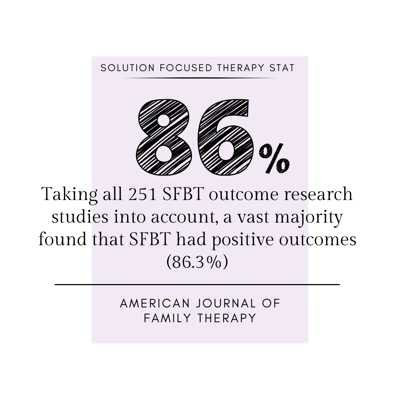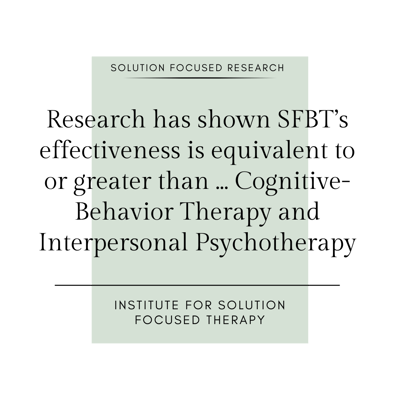Solution-Focused Therapy
Transform challenges into triumphs with Solution-Focused Brief Therapy

Are ongoing challenges or uncertainty making life feel overwhelming? At Trillium Counselling, Solution-Focused Brief Therapy offers a supportive and uplifting path forward—helping you focus on practical solutions and new possibilities.
Instead of getting stuck in what’s going wrong, SFBT empowers you to draw on your strengths, see a brighter future, and take steps toward lasting positive change. This goal-oriented approach is designed to help you discover fresh perspectives, build resilience, and move confidently toward a life that feels more balanced and fulfilling.

What is Solution-Focused Brief Therapy

Solution-Focused Brief Therapy (SFBT) is one of the world's most commonly used therapeutic treatments (De Shazer, 2007, Hsu, 2011). Developed by Kim Berg, Steve de Shazer, and their colleagues in the late 1970s, SFBT is a goal-oriented therapeutic approach that centers on identifying and building solutions rather than other traditional forms of therapy that focus on analyzing problems and life events.
At Trillium Counselling, we believe that each person already holds the inner strengths and resources needed to foster meaningful change. Through Solution-Focused Therapy, our therapists work alongside you to envision your preferred future and map out the practical steps to reach it.
By focusing on your current abilities, past successes, and real solutions, this collaborative approach helps you move beyond problem-focused thinking—empowering you to take charge and move forward with renewed confidence.
SFBT is versatile and can be effective in addressing a wide range of issues. Some of the challenges and concerns that SFBT can help with include:
- Relationship Issues: SFBT can assist individuals, couples, or families in addressing communication difficulties, conflicts, or challenges in their relationships.
- Workplace Stress: Individuals experiencing stress, burnout, or challenges in their professional lives can benefit from SFBT to explore solutions and coping strategies.
- Anxiety and Stress: SFBT can provide practical tools for managing and reducing anxiety and stress by focusing on coping mechanisms and building resilience.
- Depression: While not a replacement for more comprehensive treatments, SFBT can complement other therapeutic approaches by helping individuals set and achieve small, realistic goals that contribute to a sense of accomplishment.
- Parenting Challenges: Parents facing difficulties in parenting, communication with their children, or managing family dynamics can find SFBT helpful in identifying and implementing solutions.
- Addiction and Substance Abuse: SFBT can be integrated into addiction treatment by focusing on developing strategies for change and building a future without substance abuse.
- Grief and Loss: Individuals navigating grief and loss can benefit from the forward-looking perspective of SFBT, helping them envision a future with a sense of purpose and meaning.
- Low Self-Esteem: SFBT can assist individuals in identifying and building upon their strengths, fostering a more positive self-image and increased self-esteem.
- School and Academic Challenges: Students dealing with academic stress, motivation issues, or challenges in their educational environment can find SFBT helpful in setting and achieving academic goals.
- Life Transitions: SFBT is effective in helping individuals navigate major life transitions, such as relocation, retirement, or changes in family dynamics.
- Goal Setting and Achievement: SFBT is particularly effective in assisting individuals in setting and achieving realistic goals, fostering a sense of accomplishment and empowerment.
It's important to note that while SFBT can be beneficial for various issues, its suitability may vary from person to person. The collaborative and goal-oriented nature of SFBT makes it adaptable to different contexts and challenges, offering a positive and forward-looking perspective in the therapeutic process.
Lets us Help you Find the Right Match
Right Therapist, Right Plan, Real Support
Why Might Solution Focused Brief Therapy Work for Me?
When in pursuit of solutions, getting caught up in the minor details may not always be advantageous. If you are after results, it can often be frustrating to focus on the why or how things became issues in the first place.
This notion forms the foundation of Solution-Focused Therapy, where the focus often centers on uncovering solutions rather than extensively scrutinizing the nuances of the problem. For many individuals, the priority is to discover practical resolutions rather than becoming deeply involved in a detailed examination of the issue.
Solution-Focused Therapy is unique in that it shifts the therapeutic focus from dwelling on problems to discovering and amplifying solutions. In a time-efficient and empowering manner, this approach enables individuals to identify their strengths, set achievable goals, and cultivate a positive mindset. By emphasizing what is working and exploring possibilities for positive change, Solution-Focused Therapy equips individuals with practical tools for navigating life's challenges and fostering resilience.

By actively engaging clients in focusing on solutions, strengths, and positive changes, therapists in Solution-Focused Brief Therapy help individuals shift their perspective and work towards the desired outcomes efficiently.
How Does Solution Focused Therapy Work, What Can I Expect from SFBT?
Our SFBT sessions are tailored to help you identify and expand your strengths, set achievable goals, and develop a roadmap for positive change. Whether you're facing personal, relational, or professional challenges, Solution-Focused Therapy offers a collaborative and forward-looking space where you can harness your inner resources to overcome obstacles and create a more satisfying life.
In SFBT, therapists adopt a collaborative and goal-oriented approach to help individuals identify and work towards solutions. Here are some key actions a therapist typically takes during SFBT sessions:
The therapist collaborates with the client to identify specific and achievable goals for therapy. These goals are often focused on solutions, positive changes, and the desired future rather than dwelling on problems.
Therapists actively inquire about the client's strengths, abilities, and resources. By emphasizing existing capabilities, SFBT aims to build a foundation for creating solutions.
Therapists help clients identify exceptions or instances when the problem is less prevalent or absent. This exploration helps highlight times when the client's strategies or strengths have been successful.
A key technique in SFBT involves asking the "Miracle Question," inviting clients to envision a future where the problem has miraculously disappeared. This helps elicit specific details about the client's desired outcomes and goals.
Therapists provide feedback and reinforcement for any positive changes or progress made by the client. Celebrating even small successes contributes to the overall positive focus of SFBT.
SFBT emphasizes a collaborative and respectful therapeutic relationship. Therapists work alongside clients, respecting their expertise in their own lives, and fostering a partnership in the therapeutic process.
Support Starts Here
If you’re ready to find meaningful solutions and move forward with confidence, our experienced therapists at Trillium Counselling are here to support you with compassionate, solution-focused care. Reach out today to learn more about our approach or to book your appointment.
FAQs
Therapy works best when the 'fit' is right with your therapist. That’s why we carefully match you with someone whose expertise fits your needs and preferences. Building a strong therapeutic relationship is key to creating a supportive and effective experience.
Before meeting your therapist, you’ll complete a brief intake form. Your first 50‑minute session focuses on what brings you in, your goals, relevant history, and what success would look like. We’ll explain confidentiality and co‑create a plan so you know what comes next. It’s normal to feel nervous—your therapist will guide the pace.
The frequency of sessions depends on your needs and goals. Many people start with weekly or bi-weekly appointments and adjust as they make progress. The total number of sessions is unique to you—your therapist will work with you to find the right approach.
Solution-Focused Therapy is a supportive, goal-driven approach designed to help you recognize your strengths and create meaningful progress. Instead of dwelling on past challenges, sessions are centred on your current abilities and future aspirations.
Your therapist will:
- Ask thoughtful questions that shine a light on your existing skills and accomplishments.
- Support you in defining clear, realistic goals that reflect your values and needs.
- Collaborate with you to develop manageable, effective steps toward positive change.
This approach is focused, encouraging, and designed to equip you with practical tools to build lasting solutions that match your unique life.
Most of our services are covered by extended health benefit plans. Coverage varies with every plan, so please check your specific plan or contact your provider to confirm your benefits.
Most employer benefits cover therapy with a Registered Social Worker (MSW, RSW) or a Registered Psychotherapist (RP). We can direct bill to most major insurers when your plan allows it; otherwise, we email insurance‑ready receipts after your session.

Last Reviewed Aug 5 2025 by Caroline Brousseau
Caroline has a Masters Degree in Social Work from the University of Ottawa and is a member of the OCSWSSW. Caroline has 19 years of counselling experience and has completed numerous additional postgraduate studies and trainings in Brief Solution Focused Therapy, Narrative Psychotherapy, Cognitive Behavioral Therapy, Eye Movement Integration, Impact Psychotherapy, Crisis Intervention, Critical Incident Stress Management, Art Therapy
Not sure yet? Let’s talk it through.
If you’d like to ask questions or explore your options first, book a free 20-minute matching consult or give us a call (226-752-8857) . One of our team members will help you find the right therapist and next steps that feel comfortable for you.
%20(1).png?width=200&height=80&name=Trillium%20Counselling%20Logo%20(999%20x%20398%20px)%20(1).png)

















